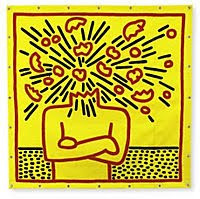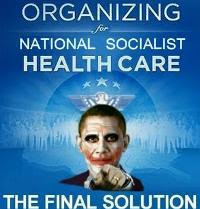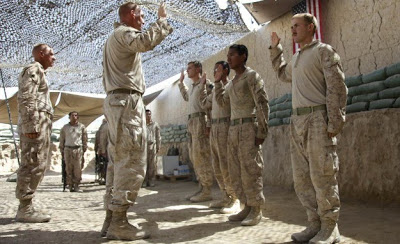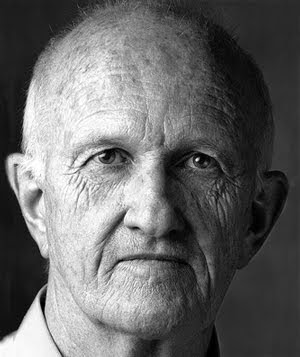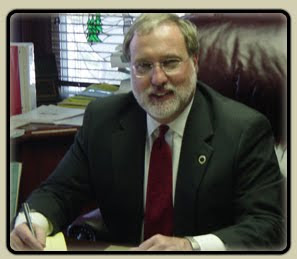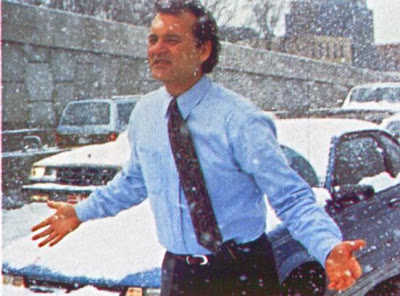 "Groundhog Day." ATF's James P. Vann searches frantically for his "lost" documents.
"Groundhog Day." ATF's James P. Vann searches frantically for his "lost" documents."The only crack is from you to the secretary." -- Federal Judge Tim Leonard to U.S. Attorney Edward Kumiega.
Folks,
I'm posting this priceless fly-on-the-wall look at the Friesen case that I've had for some time now, which as far as I know is not a court-sealed document. This is the first of a series of ATF-related documents I'm going to be posting here, although it is, for now, the only court document I have received over the transom.
Here's the lesson I take from this.
The one thing the ATF cannot afford to look like is ineffectual, foolish and downright stupid. Yet that's exactly the fate that they deliberately tempted in this case and got caught. Why? Because in the end this was about protecting their secret documents. These documents, no matter what spin they put on them, are in the final analysis just rules, regulations, policies and testing procedures that ought to be in the public domain. They refuse to release tham because then they couldn't change the rules to suit themselves in whatever particular case they're running.
Yet the one thing these people cannot stand is being laughed at, and you can't read this without thinking of lying little boys caught stealing the chocolate-chip cookies with sticky brown goo smeared on their mouths and hands, crumbs on their shirt, and jaws working furiously to swallow the evidence before Daddy gets up out of the recliner to go and get the belt. This act of public outing, courtesy of Sipsey Street, strikes at the heart of their machismo, and they will want to kill somebody for it. But, as always, this is designed to get the attention of the reputed adults in the administration -- I mean, its not like they're going to show this transcript to their bosses in pride. What I'm trying to say to the bosses like Eric Holder is, "look, these are YOUR juvenile delinquents, only they have badges and guns and eventually somebody's going to get shot. DO something."
Still, when poor old Jimmy Vann just couldn't find his "lost" documents, I laughed so hard I almost peed myself. He used every excuse except the dog ate his homework. When they realized they would have to drop the case or reveal some of their precious documents, they cockroached, headed for the base boards and Friesen walked on a misdeamenor after they'd spent at least a million dollars and years of work trying to put him in federal prison with real criminals like MS-13.
Therefore, and tell me if I'm wrong, the real lesson here is that if you are indicted by the ATF for anything, just have your lawyers work it out to threaten the disclosure of one or more ATF "secret documents," and you're home free.
Am I wrong?
The fact that I have publicly distributed this, whether it turns out to be open source (as I believe it to be) or sealed, will likely frost the ATF's testicles. It is, in their minds, a subversive act. But sunlight is only feared by rats, cockroaches and out-of-control armed bureaucrats.
I hereby assert that there is
NO ATF internal document that bears on testing, training, or procedures that shouldn't be posted in the Federal Register. None. The only way they have been able to get away with the shell game that they have for so long is that they hide their procedures from the public with the assistance of lazy judges and venal politicians.
You will note that in this case, Mr. Friesen was lucky enough to get both an honest and a tough judge, one who in the interest of justice was not afraid to challenge the federal Leviathan. David Olofson did not. Mr. Friesen, a lawyer himself, could also afford to hire the best defense attorneys. Mr. Olofson could not. Because of those circumstances, David Olofson is in prison and Doug Friesen is a free man. All because the ATF was able to prance around in the darkness in one case, and in the other, they ran from the light switch the judge threatened to flip.
Turn on the light, I say. For everybody. Let us see the ATF try to defend their secretive conduct in the light.
But for now, in this little corner of Sipsey Street, I have flipped that switch.
Enjoy, and pass it out far and wide -- especially to news reporters amd defense attorneys, for this, I believe, represents the Rosetta Stone which will break the ATF's illicit conduct in investigations and at trial. If, as is apparent, they cannot do their business in the light, then they shouldn't be doing it at all.
Mike Vanderboegh
The alleged leader of a merry band of Three Percenters
PS: And to the ATF, I say again, no more free Wacos, and that includes me. I know you're pissed, but don't do anything stupid. You know, like start a civil war. For if you come for me, a crippled old fat diabetic with a bad heart on disability, I will not go quietly. And how will you explain later that you had to kill me just because you didn't like what I put on the Internet? You could sue me, I suppose, but that would open you to discovery about so much more. I mean, really, if you have any questions, send me a letter. Gambit. Your move.
Note: The following document is a transcription of the original hard copy document. I will say up front that it did not come from Doug Friesen nor any of his defense attorneys. There may be minor errors of punctutation or spelling, but I have transcribed it completely and left nothing out. MBV. In the United States District Court for the Western District of Oklahoma
United States of America, Plaintiff, vs. Larry Douglas Friesen, Defendant
Case No. CR-08-41-L
Transcript of In-Chambers Hearing had on March 23rd, 2009 before the Honorable Tim Leonard, U.S. District Judge, Presiding.
Appearances
Mr. Edward Kumiega, U.S. Attorney's Office, 210 West Park Avenue, Suite 400, Oklahoma City, OK 73102, appearing on behalf of the United States of America
Mr. Mack Martin and Ms. Kendall Sykes, Martin Law office, 125 Park Avenue, Fifth Floor, Oklahoma City, OK 73102, appearing on behalf of the defendant. (The following was had in chambers on March 23rd, 2009:)
THE COURT: The defendants have filed a motion to continue trial based upon the government's continued dilatory production of evidence.
Mr. Kumeiga, can you explain -- had you not received the Court's order saying that everything that would be turned over would be turned over by February 20th?
MR. KUMIEGA: Yes.
THE COURT: Had you not seen that?
MR. KUMIEGA: Yes, I have, your Honor.
THE COURT: It's my understanding that you've had this document in your possession since before the last trial.
MR. KUMIEGA: Which -- which document, your Honor?
THE COURT: From Birmingham Arms.
MR. KUMIEGA: We did not -- we had -- we had it in a corrupt file. Are you talking about the Birmingham --
THE COURT: Yes.
MR. KUMIEGA: Yes. We had it, we never could -- we couldn't open it.
MR. VANN (James P. Vann, ATF): We had a reference to it, your Honor, in a corrupt file.
MR. KUMIEGA: We thought it was ---
THE COURT: But you had the actual document in your materials?
MR. KUMIEGA: Yes, we had -- we had a corrupt -- we couldn't open it, so we never thought about it. Yes, we had it.
THE COURT: So when did you think about it?
MR. KUMIEGA: When Mr. Martin asked us to go over everything again, we went back through the documents and gave it -- everybody went back through the documents and gave it -- everybody went back through the documents based on his letter, and they tried to open it up, and gave it to the intel analyst, intelligence analyst. she was lucky to open it up, and that's when we found -- it was just an investigatory tool. It's basically, we thought, just background information, not relevant at all, just thousands -- hundreds of thousands of sales by Birmingham. We found Friesen's name on 11.
THE COURT: You didn't look for any of this prior to the first trial?
MR. KUMIEGA: We couldn't open it up, so we just --
THE COURT: But you knew it was there?
MR. KUMIEGA: I didn't know it was there, but yes, it was there, we couldn't open it up and never thought it was important at all.
THE COURT: So, I mean, when did you think that it was important?
MR. KUMIEGA: We acted on his letter, and we went back to try to help Mr. Martin through his discovery letter, the discovery letter that was, I think, filed on -- that he sent to us on the 15th, I believe.
THE COURT: What, particularly, in that letter were you acting on?
MR. KUMIEGA: We just went through the old boxes looking for everything that he wanted, see if there was anything that we missed.
THE COURT: So what particularly in his letter did he -- did he ask for the Birmingham sales?
MR. KUMIEGA: No, no. Oh, no.
THE COURT: So how did that relate to his letter?
MR. KUMIEGA: We just went through everything again to make sure we're not missing anything. We went through the documents and gave it to him.
THE COURT: Shouldn't you have done that whether he wrote a letter or not?
MR. KUMIEGA: Probably, but we thought they were irrelevant, had nothing to do really with the case. That was the point. It's just information that basically was innocuous, we thought, and since the document couldn't open up, the file was corrupt, nobody thought about it. That's what happened.
THE COURT: so why, when you looked back and it was corrupt again, why did you even bother with it?
MR. KUMIEGA: They just passed it around and gave it to intel. I have no idea how the chronology of how the disk passed around. They gave it to a lady named Kirstin Liles in our office, and she opened up the document and then found that notation. But we were prompted by Mr. Martin's letter; that's why we did it.
THE COURT: What part of his letter?
MR. KUMIEGA: We just went through the box, your Honor.
THE COURT: No, but what part of his letter prompted going through that box? Tell me the paragraph.
MR. KUMIEGA: I'm looking, sir. when we were going to introduce all the other guns in the E series, we went back --
THE COURT: That didn't have anything to do with his letter.
MR. KUMIEGA: No.
THE COURT: What paragraph in his letter prompted you to go back through the Birmingham Arms?
MR. KUMIEGA: Judge, everybody -- we said, go back and find stuff, according to the letter.
THE COURT: But what part of the letter -- I don't see anything related to the sale of machine guns.
MR. KUMIEGA: "All investigative reports and photographs relating the E series of machine guns." That's where Birmingham Pistols had the E series of machine guns. That's what prompted us to go back and look through everything again. we didn't think it was -- had any relevance at all, your Honor. It was just -- it was just thousands and thousands of transactions between Davenport and everybody else in the machine gun community, or even outside the machine gun community. It's everybody that Davenport did, Davenport and Guy Walker. That's what -- that's why we went back, out of an abundance of caution, we were trying to satisfy his request, Judge. That's what happened.
THE COURT: Response, Ms. Sykes or Mr. Martin.
MR. MARTIN: Judge, Thursday we got this CD, and we couldn't open our copy. When you open it, it's -- it's in our motion. We got this one that we could open on Friday afternoon. And contrary to our motion -- let me say this: with the CD we got this printout and it has nine entries on it, that's related to Mr. Friesen. But contrary to what we put in our motion, after we were able to open this, after we received it Friday, after we had already filed our motion, the CD is like a computer, Judge, it has lots of subdirectories, a lot of different files in it. There is a file that has -- not the one they got these materials out of there's a file in there called Gun Query that has over 509,000 entries in it that is what I would call chocked full of exculpatory evidence.
THE COURT: What kind of exculpatory evidence?
MR. MARTIN: It's my belief, and I think the government -- the government indicated to us in a cell phone call last week that they now believe that Mr. Friesen, I guess from the conversations I had related to me from Ms. Sykes, that they now believe that Mr. Friesen obtained this firearm only in tube form. And this CD is chocked full of evidence that would absolutely contradict that assertion. We didn't find that until Saturday and we haven't had much chance to look at it all. We think there's some much more specific information in there that might be helpful to us, but there is no way we can go through 509,000 entries on just one file. I anticipate, I haven't done a complete search of this, but I would suspect there's close to a million entries on this CD, Judge. But if the government's position is that he received this as a Sten tube only, this thing is full of exculpatory evidence.
THE COURT: How?
MR. MARTIN: I would like to -- if I present it to you, Judge,I would like to do it in camera ex parte. I mean, I've got documents I can show you, but I just don't think it would be appropriate --
THE COURT: Is that the basis of introduction of this, is to show that he purchased only a Sten tube?
MR. KUMIEGA: Yes.
THE COURT: But the document.
MR. KUMIEGA: Yes.
THE COURT: And so what basis, what foundation is that? Based on the price?
MR. KUMIEGA: Yes. Yes. From talking to Guy Walker, he said the $500 is basically a price for a tube, it's not for a machine gun.
MR. MARTIN: That's not what his 302 says you gave us, Ed.
MR. KUMIEGA: What did it say?
MR. MARTIN: It said $200.
MR. KUMIEGA: It doubled. It's $200 from Erb, and then he would sell it for retail. That's my understanding of --
MR. MARTIN: That's not what his 302 says. That's news to me again. That's other new information.
MS. SYKES: The 302 said he would sell them as fully put together machine guns for between 5 and $600. I don't know if that was Mr. Davenport or Mr. Walker.
MR. MARTIN: That was Mr. Davenport.
MS. SYKES: We don't have a statement from Mr. Walker on that, I don't believe.
MR. KUMIEGA: My understanding is they got the tube from Erb --
THE COURT: Mr. Walker was -- refresh my recollection.
MR. KUMIEGA: He was the owner of Birmingham Pistols. Mr. Davenport was the manager and he's the one that testified at trial.
MR. MARTIN: the information that has been provided, Judge is that they would sell Sten tubes for around $200, they would sell -- back in '96, and they would sell fully automatic firearms, from his 302 or ATF form, whatever they call it, for between 5 and $600, fully automatic weapons. That's the first time we've heard Sten tubes cost $500, is right now.
THE COURT: What does the 302 say, or the ATF's --
MR. KUMIEGA: I don't have it in front of me.
MR. MARTIN: I can get it in two minutes if you want me to, but it says exactly what I just told you.
THE COURT: Okay. What about the other issue relating to the -- as what Mr. Kumiega selectively culled out from the procedures and manuals of the ATF and --
MR. MARTIN: We've got nothing relating to the manuals, Judge. You mean the manuals that we talked about in that motion hearing the other day?
THE COURT: Yes.
MR. MARTIN: We've basically been told we're not entitled to it, that we have no constitutional right to it. I responded via e-mail to him that --
THE COURT: I thought that the -- he offered to provide portions that his expert might testify about, about policies and procedures from memos or manuals or whatever, was my understanding. But has anything been provided to you?
MR. MARTIN: As relates to the manuals, no sir.
THE COURT: Even the part he offered to provide?
MR. MARTIN: Nothing.
MR. VANN: Your Honor, during the conversation what we said was we would produce some sections they thought was, or that --
THE COURT: Who is "they?"
MR. VANN: I'm sorry. That defense, if we could come to an agreement, that if they could narrow down the request for a particular time, a particular section we would be happy to provide it under protective order. We were informed that was not acceptable, they wanted full or nothing, and they would have the Court rule on whether or not they were entitled to any of it, at which point we said we're still willing to do this under protective order, and I explained that we thought under protective order how far that would go, during the conversation. That was rejected out of hand, and that was the end of the conversation. So we responded to the letter saying again, we're willing to discuss this, if you're going to do it just tell us which sections are applicable to this or what you want, and I was told we don't know what's in there, so we have to have the whole thing so we can look at things to determine whether or not we need anything. I said that's not acceptable, we can't hand you the whole manual. That's the whole point of this.
THE COURT: I think in my discussion in court I said something about filing a motion to compel by Monday if you couldn't get something worked out. We heard nothing, so I assumed everything was worked out.
MS. SYKES: May I respond to his --
THE COURT: And you said you're going to be out of town, but Ms. Sykes would take care of it, and she said Monday by five would be fine.
MS. SYKES: We didn't receive a response from the government until Tuesday. At that point I wasn't quite sure if we were going to file a motion to compel or not, and frankly, last week just going through all of the discovery, it was something I thought we could ask the Court to rule on at a later date. But as of Monday --
THE COURT: What would be a later date?
MS. SYKES: Well --
MR. MARTIN: Judge, one thing that happened is this: when I left town, contrary to my request, e-mails were sent to me and not to Ms. Sykes. I sent to the government four e-mails saying she's an attorney in this case, and she never got a lot of their e-mails. So I had to call them -- I had to e-mail them I don't know how many times and say -- well, I do know, four times -- and say, send your e-mails to Kendall, I'm not in the office. So if they sent them to me, she didn't see them. She got most of them Friday when I got back in town.
MS. SYKES: I did -- I --
THE COURT: So did you have a laptop with you?
MR. MARTIN: No, sir. I had a Blackberry and saw I got an e-mail from the government, but I couldn't open it up. So to the extent I could, I tried to forward what I could, but it wasn't that I was accessible with it all the time.
MS. SYKES: Your Honor --
THE COURT: Why didn't you send e-mails to Ms. Sykes?
MR. KUMIEGA: Judge, it -- it was either -- I don't know why. It was my secretary sending stuff out. We thought that when we sent it to Mack it gets forwarded to Kendall. We never --
THE COURT: Were you told to send it to Kendall?
MR. KUMIEGA: Yes.
THE COURT: So why didn't you?
MR. KUMIEGA: I don't remember. It just fell through the cracks.
THE COURT: The only crack is from you to the secretary.
MR. KUMIEGA: Yes. Yes, Judge. I'm busy getting prepared for a case. We thought we sent everything to Mr. Martin, we didn't hear back from Kendall. We thought everything was -- we had our -- our position was on Thursday --
THE COURT: So Mr. Martin did tell you to send everything to Kendall?
MR. KUMIEGA: Yes. He --
THE COURT: You knew he was out of the office?
MR. KUMIEGA: Yes.
THE COURT: You didn't send it to Kendall?
MR. KUMIEGA: I didn't -- I thought we did. I -- no, we did not send it to Kendall.
MR. VANN: If I may, he responded with a cc to Kendall Sykes on it. Here's the e-mail to Linette saying we should deal with her in the future. So as of within minutes of getting our response on the 17th, Ms. Sykes knew that we had sent the response. She has it right here. We've got the forwarding of our original saying in the future please copy her on all these emails. So that letter which is so important, she was notified within minutes of getting it. So -- now, if there's no attachment, I apologize for that. We could at that point have followed up, but we received --
THE COURT: But after being requested, you didn't ever send anything directly to Ms. Sykes?
MR. KUMIEGA: We thought it was done. It's my mistake. We thought she had it.
MR. MARTIN: And that's not the only thing they didn't send to her, Judge. They still continued to send things to me. And you know -- anyway. So --
MS. SYKES: Your Honor, may I just briefly respond to Mr. Vann's comments about -- I'm the one that actually went and met with the government after our Daubert hearing, I think it was on Thursday, two Thursdays ago. And basically, he's saying our letter, our discovery letter, we're asking for too broad of categories. And we -- just also for the record, we had asked for any ATF manuals relating to the compliance inspections prior to their expert testifying at the Daubert hearing. We already believed they were very relevant to the credibility of the inspectors that conducted the compliance inspection in this case.
With that said, on the one hand, he's saying our requests are way too broad, narrow down to the specific sections you want. But we don't -- defense does not know what sections are in that. So it's like, you're asking for too much, but I can't give you the manuals, you can indicate specifically what you want. And it was my position during the meeting that we should be able to observe the entire procedure manual, or whatever handbooks they have under a protective order, and then if the judge wanted to rule only specifics things were relevant, then that's different. But we were unable to narrow our request simply because everything is so secretive and protective, for whatever reason. And so that was why -- I'm not saying he's completely misrepresenting our conversation, but I'm just explaining why our position is we need to see the whole manual, even under a protective order.
THE COURT: Which manual?
MS. SYKES: Well, we don't know for sure which ones, but we do know from the Daubert hearing there's at least two. There's an operations handbook, or something the ATF I guess sends out to the field, I don't know exactly who they send it to, but I think -- how do you say Strotheide?
MR. KUMIEGA: Strawhide (phonetic).
MS. SYKES: Strotheide.
THE COURT: Are you talking about the civil part of the ATF or the criminal part?
MS. SYKES: Well, it would be civil. I don't know what -- I don't know if they --
THE COURT: Dealing with compliance?
MS. SYKES: Yes, your Honor. Solely dealing with the compliance instructions and the policies thereto. And there was two documents referred to in the Daubert hearing by Mr. Strotheide. One was some sort of operations manual, and one was some ATF handbook. And he had said that they have -- I'm assuming they get updated handbooks yearly or every few years, because he said there have been some changes. Those are the only two we know of for sure.
THE COURT: Okay, On that subject -- what's his name?
MR. KUMIEGA: Strotheide.
THE COURT: Strotheide. If the Court -- the Court had indicated that Mr. Strotheide night only be used in a rebuttal capacity, if the -- if I don't allow him to testify, does that take care of the problem with the manuals?
MS. SYKES: It takes care of one aspect, but no, your Honor. It's our position that the credibility of Inspectors Rowden and McGrew in this case is paramount to the government's -- they are basically saying that the inspectors are well-qualified in their job, came out to Mr. Friesen's and conduct a compliance inspection on February 17, I think or 19th, 2003, and are so well-acclimated to their job and so good at what they do that the jury can trust that they did not see E683, and we believe that these procedure manuals will go to their credibility.
THE COURT: How?
MS. SYKES: Well, not seeing the manuals it's hard to say for sure, but if, for instance, it kind of --
THE COURT: I mean, if the testimony is they did not see this one thing, that doesn't have anything to do with the manuals, does it?
MS. SYKES: Well, it could. It depends on what's in the manuals. We have always --
THE COURT: Thy either saw it or they didn't see it.
MS. SYKES: Well, we know that a lot of the serial numbers are very hard to see. In fact, even the government when they went out and rounded up a lot of these serial numbers to take pictures in the first trial had to use chalk and different things to even see them.
THE COURT: What does that have to do with the manuals?
MS. SYKES: Well, not knowing what's in the manuals, I'm not for sure, but what I suspect is that there might be procedures about if -- before you determine that somebody is in possession of an illegally -- an unregistered machine gun, of which there is huge consequences for that firearms owner, that maybe they have procedures they are supposed to follow to ensure before they write that down that -- I mean, we at the trial hypothesized maybe a penlight, a magnifying glass, maybe --
THE COURT: So that's the one area you need to see?
MS. SYKES: That would be of great interest. Anything bearing on procedures to ensure that they can check on their list. We definitely, based on our procedures and our qualifications, know that there is not a serial number of there's the wrong serial number on this particular firearm.
THE COURT: So if the Court reviewed the manuals in camera in that one area, and provided you any -- or turned over to you any sections that's related to that kind of procedure --
MS. SYKES: I would -- I would be agreeable. We certainly trust the Court in that regard. Our problem is just having to rely on the government giving us what they thought was relevant.
THE COURT: I understand.
MS. SYKES: I don't know what Mack thinks about it.
MR. MARTIN: That would be fine, judge.
MR. KUMIEGA: Judge, just for a matter of the record, Mr. Friesen couldn't find the serial number himself.
THE COURT: We're trying to get --
MS. SYKES: For the record --
THE COURT: Any problem with that?
MR. VANN: Your Honor, I have people at headquarters who are trying to find the manual that was applicable during that time. They've been searching for it, looking for it. As soon as I have it -- I'll call this morning to see if they've located it, they were trying last week to find that. I was told by them that, by somebody who is familiar with the manual during that time, they were extremely general. And I asked those questions, such as were there policies for exam and using penlights.
THE COURT: So if I continue the trial, will they find it the Friday before trial?
MR. VANN: Your Honor, we were put on notice on the 10th, and we discussed it on the 12th, and I had -- by the 12th, I had already contacted ATF and was searching for these documents. Within minutes of hearing from Ed on this issue, I had -- I was placing calls trying to locate this stuff so we could be responsive. I will tell you that (unintelligible) doesn't have it, but that our field ops may, and they were presently working, looking for it, and they were searching old files and everything else.
Those manuals were so generic and so general and they were superseded every year, so finding it, they informed me, would be a very difficult task, but they were actively looking for it. So they may have it now, or they may be able to tell me now that it doesn't exist, they don't have it. But I was told -- I'll represent to the Court as soon as I hear something I will report it, but I will tell you now that it will be a few pages long, and it will contain nothing regarding penlights or chalk.
THE COURT: Why don't you furnish that in camera. And as far as all of the other policies and procedures, if your expert, if the Court allows him to testify, even in rebuttal, anything that he refers to would need to be turned over under protective order in complete, not just portions, but the full documents. so you can make that decision whether you put him on or not.
MR. VANN: Your Honor, may I just ask for clarification? They are requesting any ATF document ever in existence, we're talking about during the time of the inspection?
THE COURT: That's right.
MR. VANN: Okay. Fine.
THE COURT: And that's what -- he referred to some policies.
MS. SYKES: Right.
MR. MARTIN: We've got the transcript, we can go to exactly what he referred to, and it will be easy to figure out.
MR. VANN: That's fine.
THE COURT: And it would need to be in toto under protective order.
MR. VANN: Yes, your Honor.
THE COURT: If you don't put him on, that's not an issue.
MS. SYKES: Judge, are you requesting that the government provide you a complete copy for you to look through as far as compliance inspectors go?
THE COURT: Right.
MS. SYKES: Thank you, Judge.
THE COURT: Anything that relates to what you just raised or other issues that I see as we're in the trial that you didn't specifically mention.
MS. SYKES: Thank you.
MR. VANN: For the inspectors or just put on the expert?
THE COURT: I'm saying that if you put on the expert, then anything that he is reviewing or talking about or anything else, everything needs to be turned over, not your redacted version.
MR. KUMIEGA: Judge, as to the parameters of the protective order, we talked to the Court about how narrow or how large that would be, because --
THE COURT: It would be very narrow.
MR. VANN: Thank you, your Honor.
MR. MARTIN: We don't have a problem with that, Judge.
THE COURT: Okay. The only issue that I see is if, and you can come to the Court if you need to go over some portion with your expert.
MR. MARTIN: Sure.
THE COURT: Then we could discuss whether it goes further to include an expert.
MR. KUMIEGA: Could we have a notice of who the expert is going to be? We had a Rule 16 reciprocal discovery. My understanding the only expert is going to be Mr. Savage in this case, and he's basically a firearms guy, unless Fritz Scheurne comes back again. I don't know.
MR. MARTIN: At this point, that's it, Judge. I mean, we haven't seen the manuals, we don't know what we need -- how we need to proceed in that regard.
THE COURT: So if you do, and you determine that there is something, then you would recall -- what's his name?
MS. SYKES: I believe Scheurne, on of the primary reasons we're not calling him is he was unable to be here during this period of time. We don't intend to call Dr. Scheurne. We would have to rely on somebody that we don't have right now.
THE COURT: Who do you intend to call to verify this sale of this -- from Birmingham Arms?
MR. KUMIEGA: Either Mr. Davenport, his wife, or Guy Walker, your Honor.
MR. MARTIN: Davenport testified at the first trial, didn't he?
MR. KUMIEGA: Yes.
MS. SYKES: And I believe the reason was Guy Walker claimed he wasn't familiar because he wasn't the one that input the data field and duh-duh-duh-duh-duh-duh-duh.
THE COURT: What did Mr. Davenport, did he testify about the cost or price of the gun?
MR. MARTIN: No. He testified he got them and sold then as they were, basically.
MR. KUMIEGA: He was a pass-through.
MR. MARTIN: That's what he testified to. And, I mean, I can't go into any more specific detail because I don't remember right off the top of my head, Judge. But we've since received additional investigative reports that go to pricing now, what I represented to you that if we sold a tube, we sold it for $200 during that period of time, if we sold a fully automatic gun, we sold it for 5 or $600, and then --
THE COURT: But that's Mr. Walker, right?
MR. MARTIN: No, that's Mr. Davenport.
THE COURT: Oh, Mr. Davenport said that.
MR. MARTIN: And that's what prompted this --
THE COURT: Okay. So Mr. Davenport said that.
MR. KUMIEGA: We gave them that information as soon as we got the invoice; we followed up immediately. That's what was the cascade that started the events, Judge.
THE COURT: So you've asked for a continuance to April 20th?
MR. MARTIN: I've got docketing problems, for lack of a better word, out the wazoo, Judge. We have a trial in front of Judge White, an anti-trust case set May 4th. It's not been continued before, I don't know if he would -- it's in Muskogee. L don't know if he would continue it or not. But when I saw Ed, I guess it was Friday, he anticipates this will last two weeks. Isn't that what you told me Friday?
MR. KUMIEGA: Yeah.
MR. MARTIN: I was hoping it would be less.
MR. KUMIEGA: Seven to ten days. That was my feeling.
MR. MARTIN: Not realizing that my trial in front of Judge White was the 4th, Judge, I thought maybe the 20th. But Judge White might -- I've not talked to him, but I would ask him to maybe bump that case, if he would consider doing that and maybe set this the 13th. I don't know, I'll have to talk to Judge White.
THE COURT: What's the problem on the 13th?
MR. MARTIN: Of April? I don't have my calendar here, Judge. If I can run down --
MR. KUMIEGA: I have three trials but I think two of them are gone.
MR. MARTIN: Do you have the calendar, Kendall?
MS. SYKES: No.
MR. MARTIN: Could I run up to the courtroom, Judge, and grab my docket book?
THE COURT: Yes.
MR. MARTIN: I'll be right back.
(Brief pause.)
MR. MARTIN: I think the reason I picked the 20th was just to give us enough time to get everything done. The week of the 13th, it does not look like I have any major things going on that can't be moved. Next week is the -- let's see -- the 20th. Same with the next week, Judge.
THE COURT: One of the things that bothers me, Mr. Kumiega, is that order on the 9th of February said:
"The Court will not allow any issue to be raised after February 20th unless it is truly a new matter that was not known and it could not have been raised or discovered with the exercise of due diligence before February 20th."
Why couldn't this have been discovered with some kind of due diligence before then?
MR. KUMIEGA: Judge, they tried to open the file, they thought it was a bad --
THE COURT: I understand that. But they tried again and it was bad, but then somebody went further.
MR. KUMIEGA: Right. And I --
THE COURT: So why didn't they go further and do that back in December?
MR. KUMIEGA: Judge -- your Honor, I have no idea. I honestly don't know, but I will take full responsibility. I'm the captain of the ship, I should have had it done. I apologize. I don't know.
THE COURT: I think the options are -- one concern I have in continuing it is what's to keep the government from finding something new the Friday before the next trial. This has been a history.
MR. KUMIEGA: I understand. What I think I would like to suggest to the Court, because the letter we got from Mr. Martin asked for different things that we were un--
THE COURT: But I said in that order to go through everything you had and make sure you had everything in order. Basically, that was the intent and that's what it said.
MR. KUMIEGA: And we --
THE COURT: So you didn't go through it until you got a letter from Mr. Martin?
MR. KUMIEGA: Judge, we were -- we were standing pat until he said we wanted these other things, they went back and looked again, Judge.
THE COURT: Well, it looks like my option is either to continue -- either to go forward with this trial today and exclude this document and any reference to it by the government in its case in chief, and that takes care of this last-minute issue. There is a problem in that if Mr. Friesen testifies and opens the door, then I don't know whether it would be admissible or not, just see what he testified to. But if he opens the door to it where it could be used to rebut his testimony, then that's a different issue. But as far as using it in their case in chief, that would be -- the Court could -- obviously, the government has violated the Court's order in not going through their files and being ready and bringing this on at the last minute.
The other alternative would be to continue the case to the 13th or the 20th, and then unless there is some other reason, but not due to the lateness of production, allow the government to use it.
So Mr. Martin, I'm going to leave you that option.
MR. MARTIN: Your Honor, the problem we have with the first option is, going forward today and excluding the government's use of this, the information they gleaned from the CD is not so much as there's evidence on there that helps the government, there is evidence on there that helps the defense that we have just now for the first time seen as of Saturday when we went through it that is clearly exculpatory. So the sanction of saying to the government you can't use it doesn't really help us because there are 700 -- at least 750 or 60,000 entries, and maybe more. We haven't been able to open all the files ourselves because of the nature of the document, but 750,000 entries, and we have found, generically 10 to 20 --
THE COURT: I'm giving you the option, Mr. Martin, whether we proceed today and exclude that evidence or whether we continue it and --
MR. MARTIN: May I -- may we take a brief recess and go talk to our client?
THE COURT: Sure.
MS. SYKES: Just quickly, your Honor. Would you be not -- would the government be prohibited from providing the information -- they are not intending to introduce any of these records, just a receipt that they were able to dig up after they saw some entries. Isn't that correct? They are not intending to have --
THE COURT: The receipt would be excluded.
MS. SYKES: Oh, okay.
MR. MARTIN: Could we take a five-minute recess and talk to our client, Judge?
THE COURT: Sure.
MR. MARTIN: Thank you.
(brief recess)
MR. MARTIN: Judge, we ask the court to put it on the 13th, and further ask that there be deadlines set. If they intend to call Mr. Strothheide, I don't want to come in here on April 13th and say Friday they gave us this 300-page policy and procedure manual that we can't review during trial to cross-examine him, and deadlines for them to produce for you any manuals that you need to review for the compliance inspection.
MR. KUMIEGA: I agree with that.
MR. VANN: As soon as I contact ATF today we're going to give you the one that you want to review, and the other ones will be delivered under protective order right away.
THE COURT: No later than Friday?
MR. VANN: Absolutely, your Honor.
THE COURT: No later than Friday.
MR. VANN: If they exist, you'll have them before Friday.
MR. MARTIN: I've got Mr. Strothheide's testimony, your Honor. I'm trying to find in here where he talked about --
THE COURT: Anything he talked about or referred to or whatever will be produced completely under protective order.
MR. MARTIN: The protective order basically says neither Kendall nor I can disclose it to anyone without further order of the Court.
THE COURT: Yes.
MR. KUMIEGA: We don't have any problem with that.
THE COURT: And the compliance memos or manuals or whatever, everything disclosed, that disclosed to the Court by Friday also.
MR. VANN: Yes, absolutely.
THE COURT: If you cannot find one for '96, any other years or other things that might have been consistent with the policies.
MR. MARTIN: It would be 2003.
THE COURT: Excuse me, 2003. I don't know why I said that.
THE LAW CLERK: Used by the investigators?
THE COURT: Well, they may or may not have that one.
THE LAW CLERK: Or current at that time?
THE COURT: Any memo relating to compliance inspections and whatever, all of that, you know what their concern is.
MR. VANN: I gave them a broad explanation of what was at issue, your Honor, and I have them scouring, and I'll turn all that over to you.
THE COURT: And I would just say that is the government still has files they haven't opened or gone through, they're probably not going to be used in any trial on the 13th. You've had plenty of time to go through everything, unless it's exculpatory and it will have to be disclosed.
MR. MARTIN: For clarification purposes, Judge, it is my understanding also that by Friday we're going to have anything Mr. Strotheide may have reviewed.
MR. KUMIEGA: Yes. If he's going to testify.
MR. MARTIN: I understand that.
THE COURT: If they don't have it --
MR. MARTIN: If we don't get it by Friday, he can't testify in rebuttal?
THE COURT: Can't testify in case in chief or rebuttal or -- not in this case.
MR. MARTIN: Okay.
THE COURT: Anything else?
MR. MARTIN: I think Kendall's birthday falls during the trial, Judge. We may have to get a cake or something.
THE COURT: The only other thing I would say is any e-mails between the parties need to go to Ms. Sykes and Mr. Martin both. Not one or the other, but both.
The other thing I'm concerned is not only about that, after specific requests, but what was this about not just walking down this material rather than sending it FedEx or something? It's almost like the government is trying to slow everything down.
MR. KUMIEGA: No, your Honor. Judge --
THE COURT: It's two blocks down there, Mr. Kumiega. Did you send something FedEx or UPS or something to his office?
MR. KUMIEGA: We don't have a runner. It was a bundle of all this stuff they requested. It's a huge amount of stuff to bring down there.
THE COURT: You don't have anybody that can carry that down there.
MR. KUMIEGA: No, your Honor. We were working putting the case together. We don't have a runner.
THE COURT: You don't have an agent that can walk it down there?
MR. KUMIEGA: Judge, these guys are running around --
THE COURT: Didn't you realize Thursday or Friday --
MR. KUMIEGA: Judge --
THE COURT: You can't walk two blocks down there during lunch or something?
MR. KUMIEGA: Judge, we --
THE COURT: I just find all of this very troubling, that it's all last-minute, there is no effort to expedite it. And it's kind of almost, it looks deliberate to me, Mr. Kumiega.
MR. KUMIEGA: It isn't.
THE COURT: You're not doing what was requested, sending e-mails to Ms. Sykes directly. I'm just saying it's troubling to me, number one, in that it's last minute, and number two, then it's kind of like you've got three weeks to go and you're just kind of taking your time. I'm just saying it's troubling in the whole thing.
MR. KUMIEGA: I understand. Just in response --
THE COURT: So anything else --
MR. KUMIEGA: Your Honor --
THE COURT: -- you're not going to be able to introduce if you discover anything else.
MR. KUMIEGA: No. Your Honor.
THE COURT: You understand that?
MR. KUMIEGA: Yes, your honor. And I positively agree. The only reason --
THE COURT: I don't need to hear anything else.
The third day of groundhog day I hope is better, which will be April 10th, 11th, and 12th. So we'll set this, start at ten o'clock on the 13th. I'll go dismiss the jury for wasting their day. If I could sanction the government I would, but it would just be money out of the government's pocket for paying the government, but I don't want this to happen again.
MR. KUMIEGA: It won't.
THE COURT: Okay. We're through for today.
(End of proceedings.)
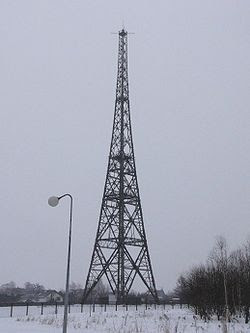 The Gleiwitz radio tower as it appears today.
The Gleiwitz radio tower as it appears today.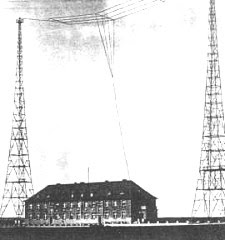 Sender Gleiwitz in 1939. The old building in Funkstrasse with two transmitter masts still in place.
Sender Gleiwitz in 1939. The old building in Funkstrasse with two transmitter masts still in place. 